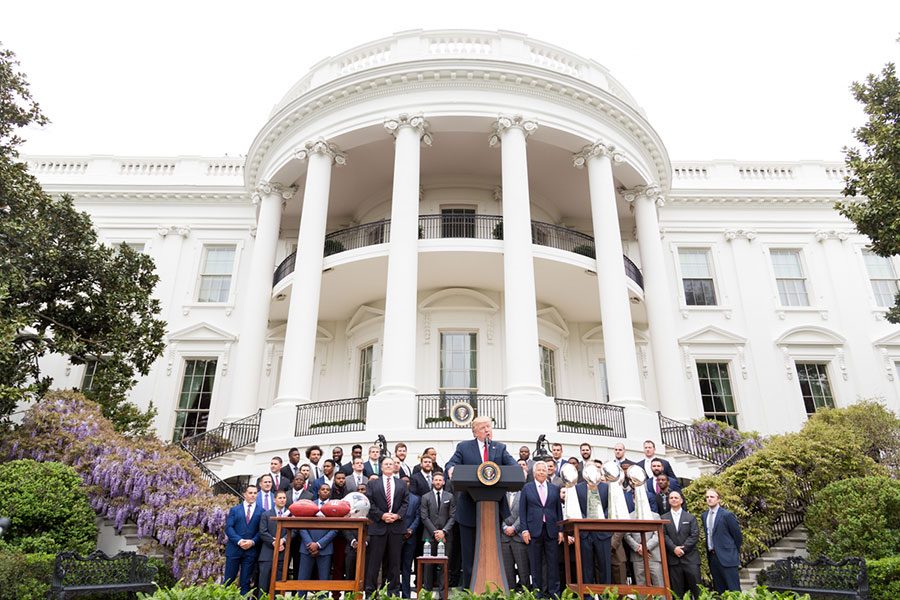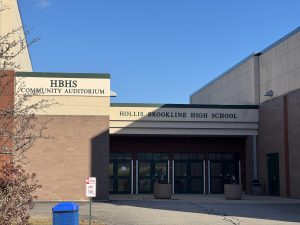NFL Protests
President Donald Trump speaks at the white house press conference following the Patriots win in Super Bowl 51. Thirty-four players attended, a number which was significantly less than the 50 who made the trip two years prior, with President Barack Obama in office.
October 11, 2017
Former NFL quarterback Colin Kaepernick began kneeling during the national anthem all the way back in August 2016 to make a statement on racial discrimination. More than a full year later, in Week 3 of the 2017-2018 NFL season, Kaepernick’s movement exploded as all 32 teams had at least one player participate in the protest. Whether it was kneeling, locking arms, staying in the locker room, or even stretching out on the ground, players did something in protest as the anthem was sung.
Many NFL players and analysts, as well as students at HBHS like Ian Babcock ‘19, think Kaepernick has the skillset to be a starting quarterback in the league, and it’s his ongoing protest of racial discrimination that keeps him on his couch rather than on the field. “I personally believe in and support [Kaepernick’s] views, but with all that aside, he should at least be a backup in today’s NFL,” said Babcock.
As many people take different stances and things become twisted, many fans are left asking “What exactly are these guys protesting?” While the original means for protest was racial discrimination, it seemed the general consensus was that President Donald Trump’s comments at an Alabama rally sparked the controversy that became national news. Trump said to his crowd in Huntsville, “Wouldn’t you love to see one of these NFL owners, when somebody disrespects our flag, to say, ‘Get that son of a [expletive] off the field right now. Out. He’s fired. He’s fired!” Trump’s take on the protests lit a new flame in the industry, and saw reactions from profound figures in sports. Twenty-seven out of 32 NFL owners issued a statement, including some who voiced their support for President Trump during his campaign, such as New England Patriots owner Robert Kraft, who said, “I am deeply disappointed by the tone of the comments made by the President on Friday…There is no greater unifier in this country than sports, and unfortunately, nothing more divisive than politics.”
Others had a more simple take on the matter, such as Buffalo Bills’ standout running back LeSean McCoy, who, directly following Trump’s comments, took to twitter, saying “It’s really sad man, our president is an [expletive].” McCoy expressed his anger towards the matter not by kneeling or locking arms with his teammates, but by laying on the ground stretching as the anthem was performed. McCoy’s stretching, as well as all of those who knelt, were chastised by loud booing and vociferous fans.
Kenny Corsetti ‘19, voiced his concern for the matter, saying “McCoy and others’ antics during the national anthem were disrespectful and a disgrace to our country and our country’s military. I think it’s un-American, and if the commissioner had any sense, he would fine or suspend these players.” But not everyone was so discontent with the protests. Jacob Abraham ‘19, expressed his support for the matter, saying “I don’t really see a problem with [the protests], they’re preaching a good cause, I’m for it.”
President Trump fired back on Twitter with an array of tweets after Sunday’s events concluded, reiterating that the flag and country should be respected, and that the kneeling was a sign of blatant disregard for the sacrifices that the U.S. military has made. ‘49ers safety Eric Reid, one of the first to support the movement, said, “It baffles me that our protest is still being misconstrued as disrespectful to the country, flag and military personnel… We chose to kneel because it’s a respectful gesture.”No matter what the intention or purpose of the protests are, they will continue to be a talking point throughout the ongoing NFL season. The players participating in this protest have spectators at home doing their own kind of protesting: boycotting the NFL as a whole.
Sports Illustrated published a compilation of letters from infuriated fans shedding light on their take on this story. Lifetime Steelers fan Jim Colleti said, “I have never intentionally turned off a Steelers game, that changed today… to not participate in the national anthem is an insult to every serviceman who has served or has passed away defending this country… I will no longer waste my time or money watching your product.” Colleti’s claims may represent the 10% decrease in viewers from Week 3 of the 2016-2017 NFL season to this year’s Week 3. Whether or not the fans continue to boycott should make for an interesting storyline for the season, and could further prove Robert Kraft’s claim that while sports is America’s greatest unifier, there is nothing more divisive than politics.













